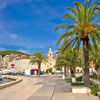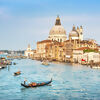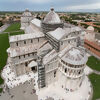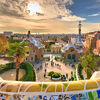10 Nights | Europe
You will visit the following 9 places:

Split
Split is the largest Dalmatian city, the second-largest urban centre in Croatia, and the seat of Split-Dalmatia County. The city is located on the shores of the Mediterranean, more specifically on the eastern shore of the Adriatic Sea, spreading over a central peninsula and its surroundings, with its metropolitan area including the many surrounding seaside towns as well. An intraregional transport hub, the city is a link to the numerous surrounding Adriatic islands and the Apennine peninsula, as well as a popular tourist destination. Split is also one of the oldest cities in the area, and is traditionally considered just over 1,700 years old, while archaeological research relating to the ancient Greek colony of Aspálathos establishes the city as being several hundred years older.

Dubrovnik
Dubrovnik is a gorgeous Croatian city on the Adriatic Sea coast positioned at the terminal end of the Isthmus of Dubrovnik. It is one of the most prominent tourist resorts of the Mediterranean and listed as a UNESCO World Heritage Site since 1979. The city is nicknamed "Pearl of the Adriatic". The success of Dubrovnik’s tourist industry has brought a certain degree of complacency and self-satisfaction. Certain aspects of the city’s appeal remain immune to tourist numbers, however, most notably the uniquely stunning setting and the unjaded straightforwardness of the Dubrovčani themselves.

Venice
Venice is a city in northeastern Italy sited on a group of 118 small islands separated by canals and linked by bridges. The city is renowned for the beauty of its setting, its architecture, and its artwork. The city in its entirety is listed as a World Heritage Site, along with its lagoon. Venice has been known as the La Dominante, Serenissima, Queen of the Adriatic, City of Water, City of Masks, City of Bridges, The Floating City, and City of Canals. It has also been described as being one of Europe's most romantic cities. It is truly an amazing, stunning and interesting city for the adventurous to explore!

Pisa
Pisa is a city in central Italy's Tuscany region best known for its iconic Leaning Tower (the bell tower of the city's cathedral). Although Pisa is known worldwide for its leaning tower, the city contains more than 20 other historic churches, several medieval palaces and various bridges across the River Arno. Much of the city's architecture was financed from its history as one of the Italian maritime republics. The city is also home of the University of Pisa, which has a history going back to the 12th century and also has the mythic Napoleonic Scuola Normale Superiore di Pisa and Sant'Anna School of Advanced Studies as the best sanctioned Superior Graduate Schools in Italy.

Barcelona
Barcelona – Spain's enchanting capital, second largest and most populous city. It is a huge city that vibrates with life, and there’s certainly not another city in the country to touch it for its sheer style, looks or energy. It is one of the world's leading tourist, economic, trade fair and cultural centers, and its influence in commerce, education, entertainment, media, fashion, science, and the arts all contribute to its status as one of the world's major global cities. Barcelona is home to masterpieces of many great architects – the most famous of which is Antoni Gaudí.

Sorrento
Sorrento Neapolitan: Surriento is a town overlooking the Bay of Naples in Southern Italy. A popular tourist destination, it can be reached easily from Naples and Pompeii as it is at the south-eastern end of the Circumvesuviana rail line. The Sorrentine Peninsula has views of Naples, Vesuvius and the Isle of Capri. The Amalfi Drive, connecting Sorrento and Amalfi, is a narrow road that threads along the high cliffs above the Tyrrhenian Sea.

Monte Carlo
Monte Carlo, officially refers to an administrative area of the Principality of Monaco, specifically the ward of Monte Carlo/Spélugues, where the Monte Carlo Casino is located. Monaco has four traditional quarters - from west to east they are: Fontvieille (the newest), Monaco-Ville (the oldest), La Condamine, and Monte Carlo. Monte Carlo (literally "Mount Charles") is situated on a prominent escarpment at the base of the Maritime Alps along the French Riviera. Near the western end of the quarter is the world-famous Place du Casino, the gambling center which has made Monte Carlo "an international byword for the extravagant display and reckless dispersal of wealth". It is also the location of the Hôtel de Paris, the Café de Paris, and the Salle Garnier (the casino theatre which is the home of the Opéra de Monte-Carlo).

Civitavecchia
Civitavecchia is a town and comune of the Metropolitan City of Rome in the central Italian region of Lazio. A sea port on the Tyrrhenian Sea, the name ''Civitavecchia'' means "ancient town". The modern city was built over a pre-existing Etruscan settlement. The massive Forte Michelangelo was first commissioned from Donato Bramante by Pope Julius II, to defend the port of Rome. The upper part of the "maschio" tower, however, was designed by Michelangelo, whose name is generally applied to the fortress. North of the city at Ficoncella are the Terme Taurine baths frequented by Romans and still popular with the Civitavecchiesi. The modern name stems from the common fig plants among the various pools. And also next to the town is the location of the cruise ship docks. All major cruise lines start and end their cruises at this location, and others stop for shore excursion days that allow guests to see Rome and Vatican sights, which are ninety minutes away.








